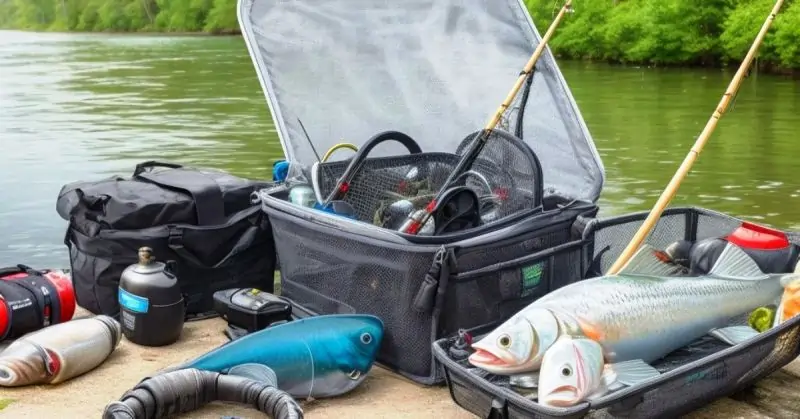What Is The Best Fishing Gear For Beginners
Although taking up a passion like fishing can be scary, it’s a fairly approachable activity. A bright day, some water, a cooler full of snacks, and all the time in the world are all you’ll need. Well, well, you’ll need some stuff. Purchasing the right rod, reels, lines, and baits may seem overwhelming to someone new to fishing, but it’s not that difficult to get your gear. The greatest fishing equipment for novices is listed below.
Fishing Rod and Reel
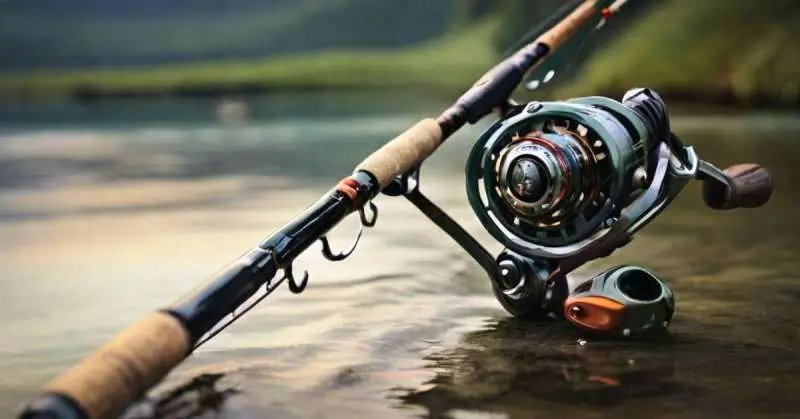
The fishing rod and reel combination is without a doubt one of the most important items on the list of necessary fishing gear. Together, these two dynamic partners provide invaluable support to anglers in their pursuit of the ultimate catch.
Fishing Rod: The rod is your main equipment to fight with the fish. It needs to be sturdy enough to handle the struggle yet sensitive enough to feel the slightest bite. Rods come in various types, lengths, and materials. They can be telescopic for easy storage or have multiple pieces that you can assemble.
Fishing Reel: The reel is attached to the rod and winds the line. various types of reels are available in the market, which include, spinning, baitcasting, trolling, and fly reels. The selection of the reel will depend upon the fishing style, targeted species, and the angler’s proficiency level.
Fishing Line
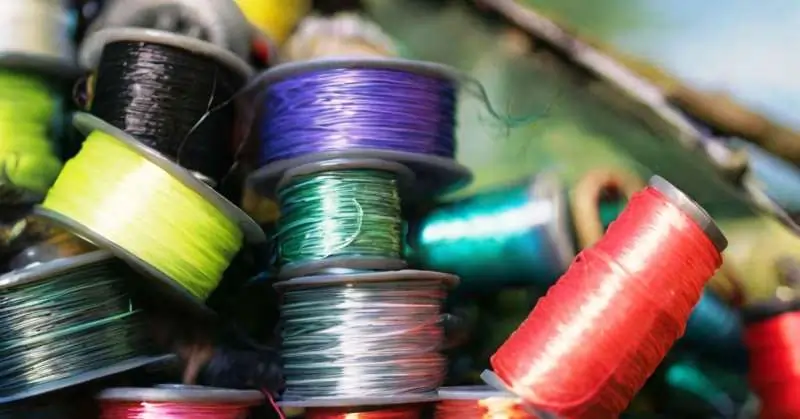
After the rod itself, your fishing line is the most important piece of equipment since it connects you to the fish. You can utilize a variety of fishing line kinds. Every movement, pull, and drag-screaming run from the rod hook travels through the line to the angler.
Hooks
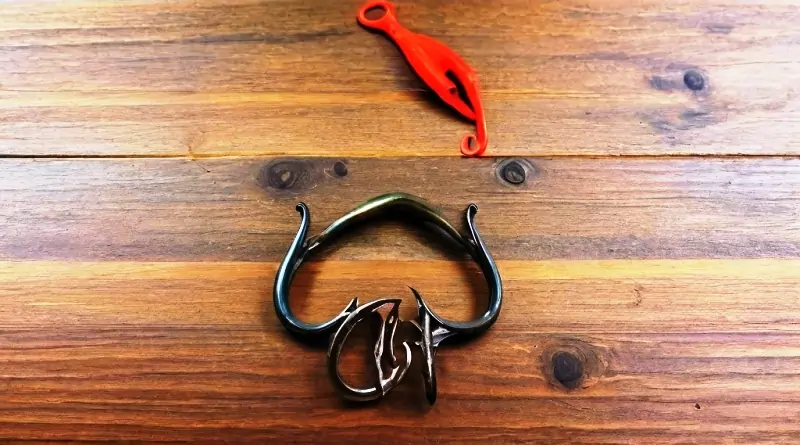
A fish hook, also known as an angle (from Old English angol and Proto-Germanic *angular), is a type of hook used to catch fish. It can be used for impaling, which is less common, or for piercing and embedding onto the inside of the fish’s mouth (angling).
Bait
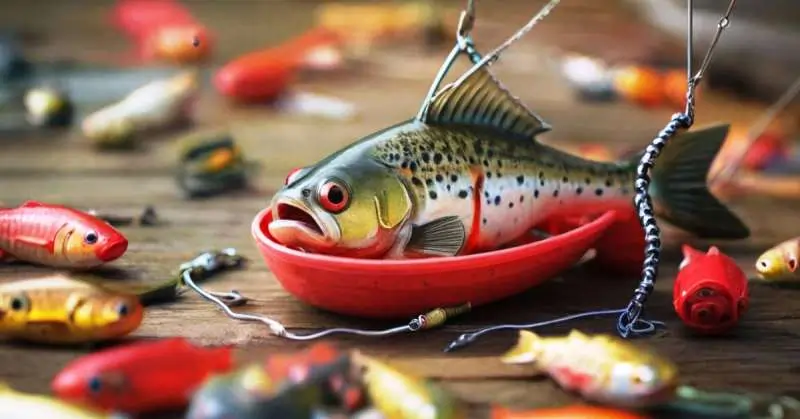
Bait is a critical part of fishing that attracts and lures fish to your hook. It can be natural, like worms, minnows, or insects, or artificial, such as plastic worms or crankbaits. The choice of bait depends on the type of fish you are targeting, the fishing location, and the time of year. Live baits are often effective, but artificial lures are also popular due to their convenience and the ability to mimic various prey. Understanding the eating habits of the fish you’re trying to catch will help you select the most effective bait.
Bobbers
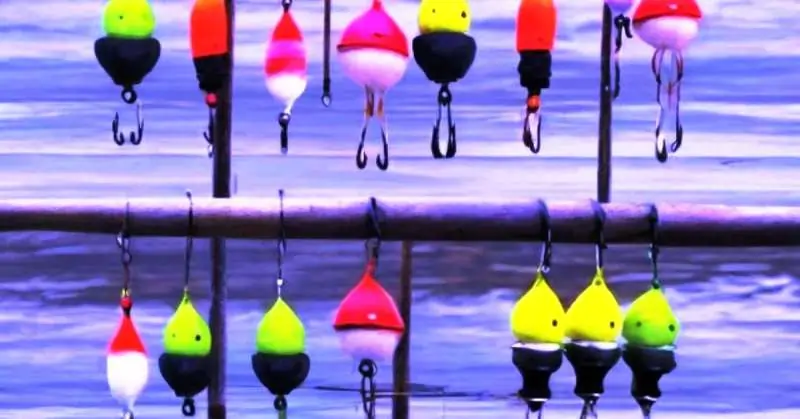
Bobbers, also known as floaters, are an essential part of any fishing gear setup. They are attached to the fishing line and float on the water’s surface. When a fish bites the bait and tugs at the line, the bobber will dip or move, indicating to the angler that it’s time to reel in. Bobbers come in a variety of shapes, sizes, and colors, the most common being the red and white round bobbers. They help control the depth of the bait and signal when a fish is biting.
Sinkers
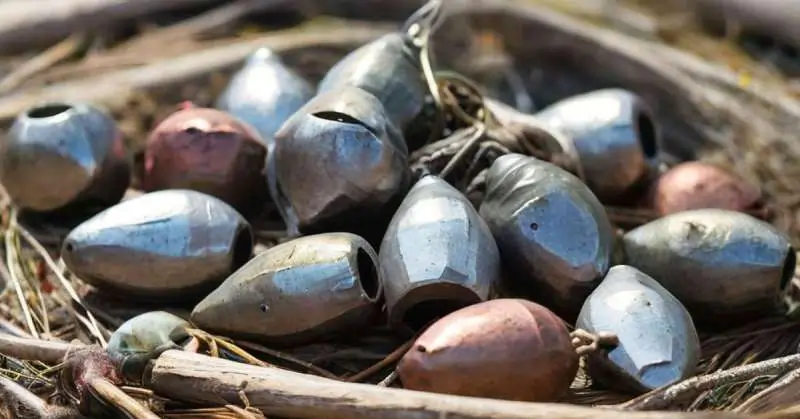
A critical component of most fishing rigs, sinkers are weights used to force the bait to sink more rapidly or to increase the distance that line is cast. Made from lead, brass, tungsten, or steel, sinkers can be as light or as heavy as you need them to be, depending on the fishing situation. Some sinkers are attached to the line by loops or snaps, while others are slid onto the line. This help to stabilize the line and allow you to cast your bait into deeper waters where fish may be lurking.
Fishing Lures
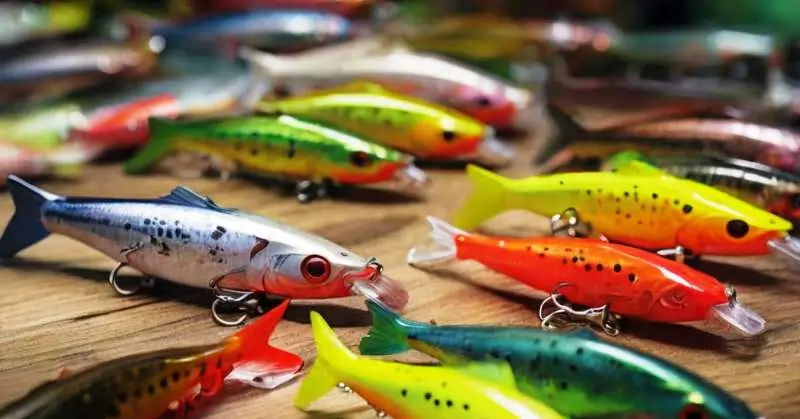
Fishing Lures: These are designed to mimic the look and movement of the prey of the fish that you’re trying to catch. Available in a wide range of shapes, colors, and sizes, fishing lures can be used in both saltwater and freshwater environments. Some lures are equipped with one or more hooks to catch fish when they strike the lure. Common types of lures include plugs, spinners, spoons, soft plastic baits, jigs, and flies.
Fishing Knife
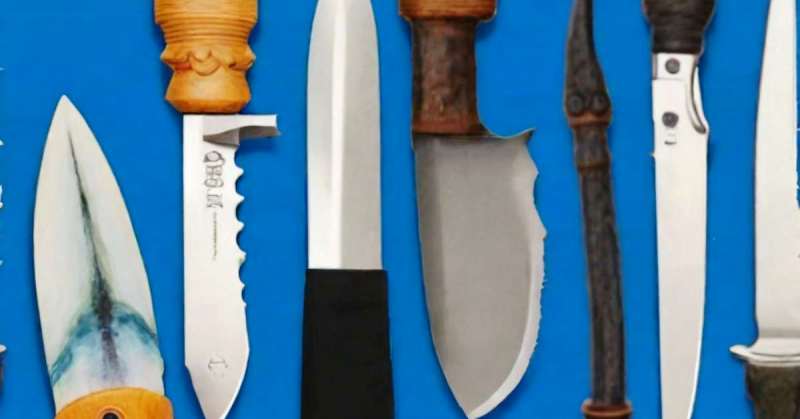
A crucial piece of equipment for every angler, a fishing knife serves various purposes. It is generally used for cutting the fishing line, cleaning and gutting the fish, and sometimes even for self-defense. The best fishing knives are made of corrosion-resistant materials to withstand the harsh aquatic environment. Many come with additional features like a scaler, a hook remover, or a sharpener. Due to its multi-functionality, a fishing knife is an essential item to include in your fishing gear.
Fishing Net
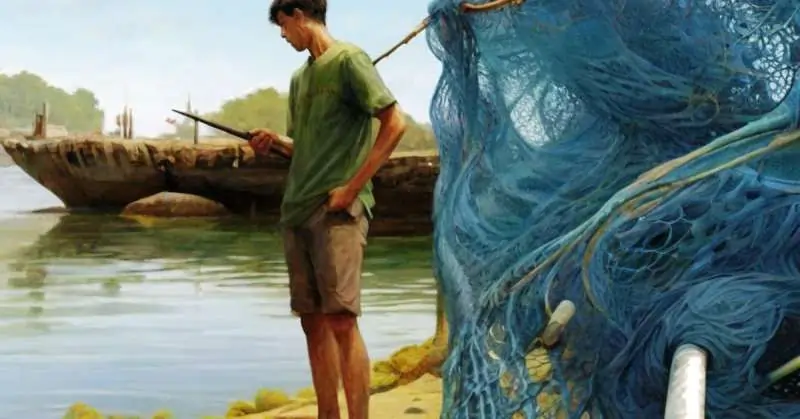
An essential part of an angler’s gear, the fishing net helps secure your catch and prevent it from escaping back into the water. Fishing nets come in a variety of sizes and styles, depending on the type of fish you are aiming to catch. For example, you might use a smaller, hand-held net for freshwater fishing, while a larger, more durable net would be appropriate for saltwater or big game fishing. Some nets are designed to be gentle on the fish’s scales, making catch and release an easy process. Always choose a net that suits your fishing style and target species.
Tackle Box
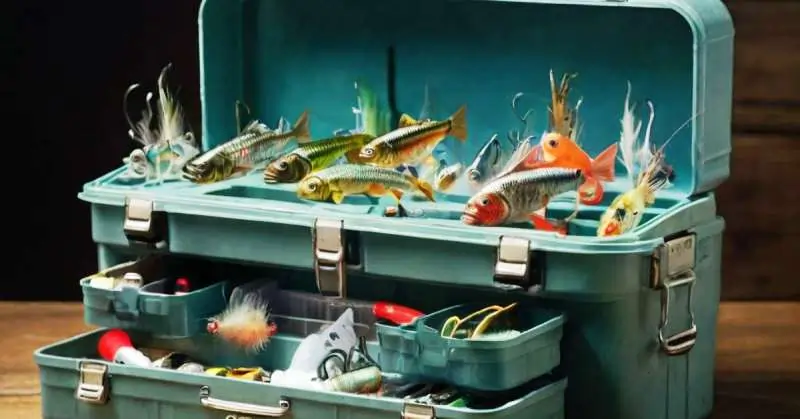
The tackle box is essentially the angler’s toolbox. It organizes and stores all your fishing essentials such as hooks, lines, sinkers, lures, and bobbers. Tackle boxes come in various sizes and configurations, from simple one-tray boxes for beginners to multi-tray and drawer boxes for seasoned anglers. Many tackle boxes also have special compartments for different items, making it easy to find what you need. They are typically made of durable materials like plastic or metal to withstand outdoor conditions. Always ensure your tackle box is well-stocked and ready for any fishing adventure.
How to Care for Your Fishing Gear
Just like any other tool, your fishing gear requires regular maintenance to ensure it functions well and lasts longer. Here’s how to take care of your fishing gear:
- Rinse Your Gear: After every fishing trip, especially those in saltwater, make sure to rinse your fishing rod, reel, lures, and other gear with fresh water. This helps to remove any salt, dirt, or grime that could damage your equipment over time.
- Dry Your Gear: Always dry your gear thoroughly before storing it. Moisture can lead to rust and other forms of damage, especially for metal parts like hooks and reel components.
- Oil Your Reel: Regularly oiling your reel can keep it running smoothly. Use a lubricant designed specifically for fishing reels, and remember to remove any excess oil after application.
- Check for Damage: Regularly inspect your gear for any signs of damage. Look for any cracks in your rod, ensure your reel is functioning smoothly, and check your fishing line for any signs of wear and tear.
- Store Properly: Always store your gear in a cool, dry place away from direct sunlight. UV rays can damage fishing lines and certain types of baits. Also, keep your hooks and lures in separate compartments to avoid tangling.
- Replace When Needed: Despite best care practices, fishing gear will eventually wear out. Keep an eye on your gear’s condition and replace it when necessary.
Remember, the longevity and efficiency of your fishing gear largely depend on how well you maintain it. So, make it a point to care for your gear and it will serve you well in return.
Fishing Gear Storage Tips
Proper storage of your fishing gear not only extends its lifespan but also ensures you’re ready for any fishing adventure at a moment’s notice. Here are some essential tips for storing your fishing gear:
- Use Rod Racks: Rod racks can prevent your fishing rods from bending or getting damaged. They also provide an organized way to store multiple rods.
- Reel Care: Loosen the drag on your reels before storing them. This will help maintain the effectiveness of the drag system and prevent it from sticking.
- Tackle Box Organization: Keep your lures, hooks, and other small items organized in a tackle box. Consider using rust inhibitors or desiccants to keep your tackle rust-free.
- Line Care: Remove and replace the fishing line if it’s old or damaged. If it’s still in good condition, store it away from sunlight as UV rays can weaken the line.
- Clean and Dry: Before storing your gear, ensure it’s clean and dry. This helps to prevent rust and damage from salt or dirt.
- Temperature Control: Keep your gear in a cool, dry place. Extreme temperatures and humidity can damage your equipment.
- Bag Storage: Store your fishing gear in a bag for added protection. This also makes transportation easier when you’re ready to go on your next fishing trip.
Properly storing your fishing gear is a simple task that can save you a lot of time, money, and frustration in the long run.
Fishing Gear Maintenance Tips
Maintaining your fishing gear can prolong its lifespan, enhance its performance, and save you money in the long run. Here are some handy tips to keep your fishing gear in top condition:
- Clean Regularly: After each use, especially in saltwater, rinse your rods, reels, and lures with fresh water to remove salt, dirt, and grime. This prevents corrosion and wear.
- Lubricate Your Reel: Use a few drops of oil specially designed for fishing reels to keep it functioning smoothly. Don’t over-lubricate, as excess oil can attract dirt.
- Inspect Your Gear: Check your gear for any signs of damage before and after each fishing trip. Look for cracked guides, frayed lines, or any other signs of wear.
- Replace Line Periodically: Depending on how frequently you fish, consider replacing your fishing line at least once a season, or more often if it’s damaged.
- Storage: Store your gear in a cool, dry place, and keep it organized. Make sure your gear is clean and dry before storing it away.
- Protect Your Hooks: Keep your hooks sharp and rust-free. Use a file to sharpen dull hooks and use rust prevention methods like oiling for long-term storage.
- Servicing: Have your reels serviced annually if you fish regularly. For casual anglers, servicing every 2-3 years should suffice.
Remember, the key to extending the life of your fishing gear is regular maintenance and proper storage.
Fishing Gear Safety Tips
Fishing is an enjoyable and often relaxing activity, but it also requires a keen awareness of safety, especially when it comes to handling and using your gear. Here are some essential fishing gear safety tips:
- Handle Hooks Carefully: Hooks are sharp and can cause serious injuries. Always handle them with care, and consider using a hook cover for added safety when not in use.
- Use a Fishing Vest: A fishing vest not only provides storage but can also serve as a personal flotation device, keeping you safe near water.
- Wear Protective Clothing: Protect your skin from the sun’s harmful rays and potential insect bites by wearing long sleeves, hats, and sunscreen. Gloves can help protect your hands when handling fish and sharp gear.
- First Aid Kit: Always carry a basic first aid kit with you. This should include bandages, antiseptic wipes, tweezers for hook removal, and any personal medication you may need.
- Stay Aware: Pay attention to your surroundings to avoid casting near other people, trees, or power lines.
- Knife Safety: If you carry a knife for cutting lines or cleaning fish, ensure it has a secure sheath and handle it with care.
- Hydration and Food: Don’t forget to bring plenty of water and some food on your fishing trips to avoid dehydration and keep your energy levels up.
By following these safety tips, you can ensure a fun and accident-free fishing experience.
FAQ on Best Fishing Gear for Beginners
Q: What is the best type of fishing rod for beginners?
A: A medium-action spinning rod is ideal for beginners due to its versatility and ease of use.
Q: What kind of fishing reel should a beginner use?
A: Beginners should start with a spinning reel, as it is user-friendly and good for various fishing techniques
3. Q: What type of fishing line is recommended for beginners?
A: Monofilament line is recommended for beginners because it’s affordable and easier to handle than other types.
Q: Are specific baits better for beginner anglers?
A: Live baits like worms are great for beginners, as they are effective and easy to use for catching a variety of fish
Blog Post Conclusion
In conclusion, having the right gear is crucial for any fishing enthusiast. Your “Essential Fishing Gear” should include a fishing rod and reel, line, hooks, bait, bobbers, sinkers, lures, a fishing knife, a net, and a well-organized tackle box. These items not only increase your chances of a successful fishing trip but also ensure you are prepared for any situation that arises. However, the gear alone won’t make you a great angler – patience, skill, and respect for nature are equally important. Happy fishing!
